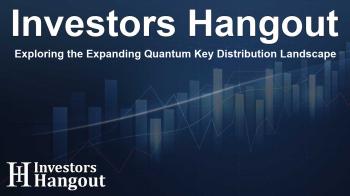Exploring the Expanding Quantum Key Distribution Landscape

The Potential of Quantum Key Distribution in Modern Security
The global Quantum Key Distribution (QKD) market is poised for remarkable growth, projected to expand from USD 0.48 billion in 2024 to USD 2.63 billion by 2030. This growth represents a Compound Annual Growth Rate (CAGR) of 32.6%, highlighting the increasing demand for advanced data security solutions.
Rising Need for Enhanced Data Security
The escalating complexity of cyber threats has made it imperative for organizations to adopt robust security measures. Companies and governments alike grapple with protecting sensitive data amidst rising cyberattacks. As a response, the QKD market is experiencing innovative developments. Notable initiatives, such as a Proof of Concept (PoC) executed by TIM Group’s Sparkle and Telsy, succeeded in securing high-capacity links with QKD between data centers, demonstrating the practicality and urgency of deploying such technologies.
Key Factors Driving Growth
Several factors contribute to the burgeoning growth of the QKD market. First, the rise of 'harvest now, decrypt later' (HNDL) attacks prompts organizations to seek immediate security solutions. Additionally, significant investments in research and development from leading tech companies are driving advancements in quantum communication infrastructure and quantum computing, fostering innovation in QKD technologies.
Potential Challenges in Adoption
Despite the optimistic outlook, the QKD market faces challenges that may hinder its widespread adoption. High implementation costs remain a barrier, particularly for smaller organizations, alongside a lack of standardization within the industry. These factors could slow the pace of adoption, requiring strategic planning and investments.
Opportunities in the QKD Market
As technological advancements continue, the QKD market presents substantial opportunities. Expansion into new domains such as 5G networks and the Internet of Things (IoT) enhances the relevance of QKD technologies. Organizations are now prioritizing data security due to the increasing integration of QKD within their infrastructure for protecting sensitive communications.
Key Players Leading the QKD Market
Several prominent companies are at the forefront of the Quantum Key Distribution market. Toshiba (Japan) and MagiQ Technologies (US) are recognized as key players, contributing significantly to market advancements. Other companies, including ID Quantique (Switzerland) and QuintessenceLabs (Australia), are actively involved in developing innovative solutions that continue to shape the market landscape.
Sector-Specific Applications
The BFSI (Banking, Financial Services, and Insurance) sector is anticipated to hold a substantial share of the QKD market due to its critical need for enhanced data security. As financial institutions increasingly face sophisticated cyber threats, they are turning to QKD to achieve cutting-edge encryption to shield sensitive data from breaches. Regulatory requirements surrounding data protection also compel the industry to employ advanced security solutions such as QKD.
Adopting QKD in 5G Infrastructure
Securing 5G networks with QKD presents a prominent opportunity, as the deployment of 5G technology accelerates globally. The substantial volume of data transmitted across these networks necessitates stronger encryption mechanisms. QKD not only facilitates secure communication but also serves as a defense against evolving cyber threats and potential future quantum computing attacks.
Conclusion: The Bright Future of QKD
The Quantum Key Distribution market is on a trajectory for transformative growth, driven by advancements in technology and the unprecedented need for data security. As organizations recognize the critical importance of safeguarding sensitive information, investments in QKD solutions will likely continue to escalate. The landscape is becoming increasingly competitive, and with room for innovation, the future of QKD looks promising.
Frequently Asked Questions
What is Quantum Key Distribution?
Quantum Key Distribution (QKD) is a secure communication method that uses quantum mechanics to create encryption keys, ensuring the protection of sensitive information.
Why is the QKD market growing?
The QKD market is experiencing growth due to increasing cyber threats, a demand for enhanced security solutions, and advancements in quantum technology.
Who are the key players in the QKD market?
Major players in the QKD market include Toshiba (Japan), MagiQ Technologies (US), ID Quantique (Switzerland), and QuintessenceLabs (Australia).
What sectors utilize Quantum Key Distribution?
Quantum Key Distribution is particularly relevant in sectors like BFSI, telecommunications, and healthcare due to their high data sensitivity and security needs.
How does QKD enhance security in 5G networks?
QKD enhances security in 5G networks by providing robust encryption methods for secure data transmission, safeguarding against potential cyber threats.
About The Author
Contact Logan Wright privately here. Or send an email with ATTN: Logan Wright as the subject to contact@investorshangout.com.
About Investors Hangout
Investors Hangout is a leading online stock forum for financial discussion and learning, offering a wide range of free tools and resources. It draws in traders of all levels, who exchange market knowledge, investigate trading tactics, and keep an eye on industry developments in real time. Featuring financial articles, stock message boards, quotes, charts, company profiles, and live news updates. Through cooperative learning and a wealth of informational resources, it helps users from novices creating their first portfolios to experts honing their techniques. Join Investors Hangout today: https://investorshangout.com/
The content of this article is based on factual, publicly available information and does not represent legal, financial, or investment advice. Investors Hangout does not offer financial advice, and the author is not a licensed financial advisor. Consult a qualified advisor before making any financial or investment decisions based on this article. This article should not be considered advice to purchase, sell, or hold any securities or other investments. If any of the material provided here is inaccurate, please contact us for corrections.

